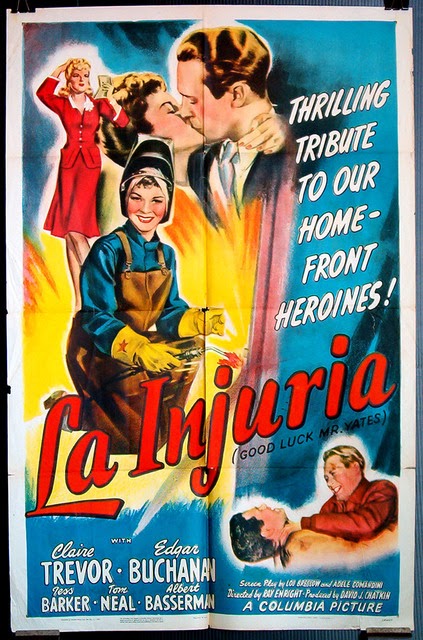On some levels, one wonders what would prompt Ms. Stanwyck to appear in this rather ludicrous story. Though hired first, she ends up billed under her ex-husband, Robert Taylor. According to this article in the Florence Times, from May 9, 1964, Stanwyck was willing to appear with her ex, if he and his wife (German actress Ursula Thiess) agreed. Taylor said it was fine with him, but when asked, the current Mrs. Taylor allegedly said "not necessarily."
While Stanwyck gets second billing, it is clearly her film. Even with an outlandish plot, special effects that are laughable, and an ending that makes you want to go "Huh?", Stanwyck is still excellent. In an age when older actresses were having to become laughingstocks in the Grand-Guignol style (think What Ever Happened to Baby Jane), Stanwyck is still elegant, and even regal. Her beauty was even more striking as she aged (my father - a huge fan - always said she got better looking every year), and at age 57 she looks like a youth when compared to much less well-preserved (and 4 years younger) Robert Taylor. (The book Barbara Stanwyck: Miracle Woman by Dan Callahan also comments on the physical differences between the stars. Be aware - there are spoilers).
Interestingly, Joan Crawford is alleged to have been William Castle's first choice for Irene. She declined, perhaps because she was at that point committed to Hush, Hush Sweet Charlotte, a role that was ultimately given to Olivia de Havilland when Crawford became ill (or, perhaps just couldn't stand the thought of working again with her rival, Bette Davis).
Possibly the biggest problem with the story is the lack of continuity. Howard Trent is horribly jealous. Why? He has a laboratory in the attic. What is he doing there? Irene owns a beauty salon, which she owned before she met Howard. Why did they marry? Why is Howard blind? The questions go on and on, but we get no answers. We're supposed to wonder why Irene is having these odd dreams, but given her rather strange marriage, it's no wonder that she is dreaming of a handsome man who adores her. And if you listen carefully, you actually can figure out WHY "The Dream" is someone who actually exists. It's quite probable that Irene met him at some point.
It was very pleasant to see Hayden Rorke in a film role - he actually had a very lengthy film career in character parts before he became so very familiar to us all as the much put-upon Dr. Bellows on I Dream of Jeannie. While this was not his last film role, he primarily did television after this movie. He'd started film acting in 1943; prior to that, he'd appeared on Broadway in 6 plays (including The Philadelphia Story, with Katharine Hepburn - he played Mac, the night watchman). He continued working until 1985, and died in 1987, age 76. He was survived by his partner, Justus Addiss.
Also in the cast, in tiny parts, are Jess Barker (who we saw in Good Luck, Mr. Yates) and Rochelle Hudson (probably best known as Shirley Temple's older sister in Curly Top). Blink, and you'll miss Ms. Hudson as Hilda, the manager of Irene's beauty shop. Barker at least gets a few minutes screen time as Mr. Malone, the inspector of the damaged house, at the beginning of the film. A shame really, that they didn't get more to do.
As Bosley Crowther in his New York Times review states, "the whole thing would not be worth reporting if it didn't have Barbara Stanwyck in the role of the somnambulistic sufferer and Robert Taylor as her husband's lawyer who tries to help." Small wonder that Ms. Stanwyck eschewed further big screen roles in favor of television. Her next role would see her in the part of the inimitable Victoria Barkley, with star billing as MISS Barbara Stanwyck for the four-year run of The Big Valley. That role would earn her four Emmy nominations, and two wins. She also would win another Emmy in 1983 for her performance as Mary Carson in The Thorn Birds. (Obviously, the Emmy voters were a lot smarter than the Oscar voters!)
We'll leave you with this trailer from the film.






FLjQ~~0_35.JPG)
